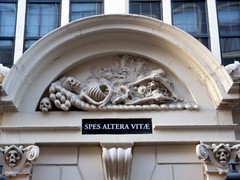 Toby and Owen started 2015 by defining existential hope, the opposite of existential risk.
Toby and Owen started 2015 by defining existential hope, the opposite of existential risk.
In their report “Existential Risk and Existential Hope: Definitions” they look at definitions of existential risk. The initial definition was just the extinction of humanity, but that leaves out horrible scenarios where humanity suffers indefinitely, or situations where there is a tiny chance of humanity escaping. Chisholming their way through successive definitions they end up with:
An existential catastrophe is an event which causes the loss of most expected value.
They also get the opposite:
An existential eucatastrophe is an event which causes there to be much more expected value after the event than before.
So besides existential risk, where the value of our future can be lost, there is existential hope: the chance that our future is much greater than we expect. Just as we should work hard to avoid existential threats, we should explore to find potential eucatastrophes that vastly enlarge our future.
Infinite hope or fear
One problem with the definitions I can see is that expectations can be undefined or infinite, making “loss of most expected value” undefined. That would require potentially unbounded value, and that the probability of reaching a certain level has a sufficiently heavy tail. I guess most people would suspect the unbounded potential to be problematic, but at least some do think there could be infinite value somewhere in existence (I think this is what David Deutsch believes). The definition ought to work regardless of what kind of value structure exists in the universe.
There are a few approaches in Nick’s “Infinite ethics” paper. However, there might be simpler approaches based on stochastic dominance. Cutting off the upper half of a Chauchy distribution does change the situation despite the expectation remaining undefined (and in this case, changes the balance between catastrophe and eucatastrophe completely). It is clear that there is now more probability on the negative side: one can do a (first order) stochastic ordering of the distributions, even though the expectations diverge.
There are many kinds of stochastic orderings; which ones make sense likely depends on the kind of value one uses to evaluate the world. Toby and Owen point out that this what actually does the work in the definitions: without a somewhat precise value theory existential risk and hope will not be well defined. Just as there may be unknown threats and opportunities, there might be surprise twists in what is valuable – we might in the fullness of time discover that some things that looked innocuous or worthless were actually far more weighty than we thought, perhaps so much that they were worth the world.
[Minor] ‘Infinite ethics’ was authored by Nick alone.
Corrected. Although Toby was deeply involved in writing it, as I recall.